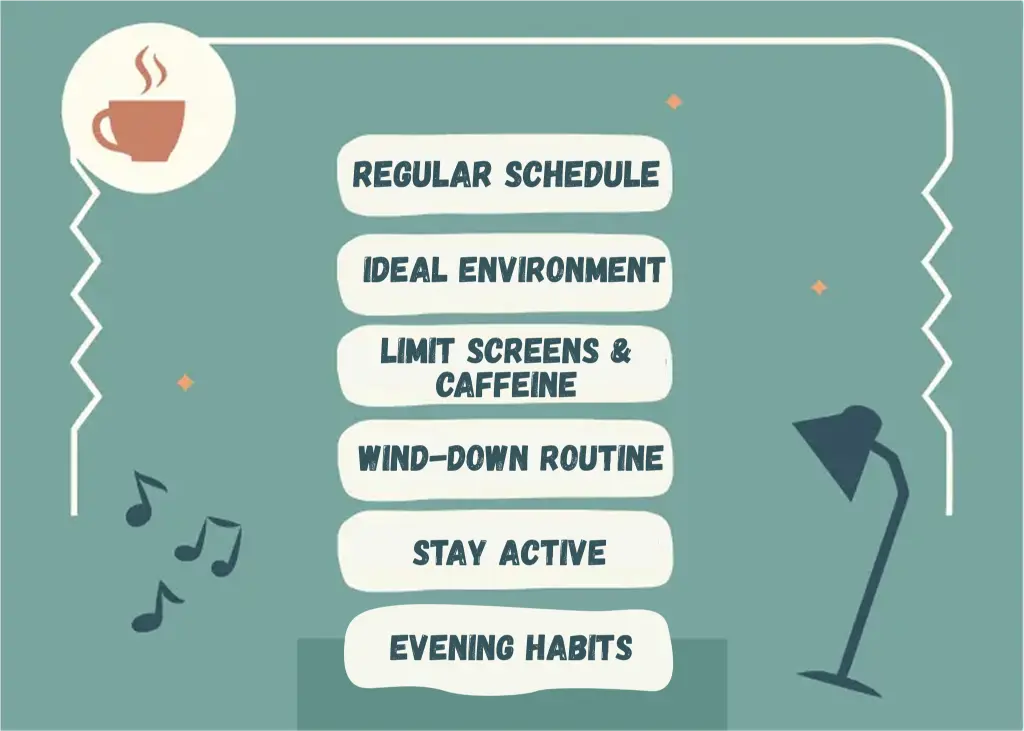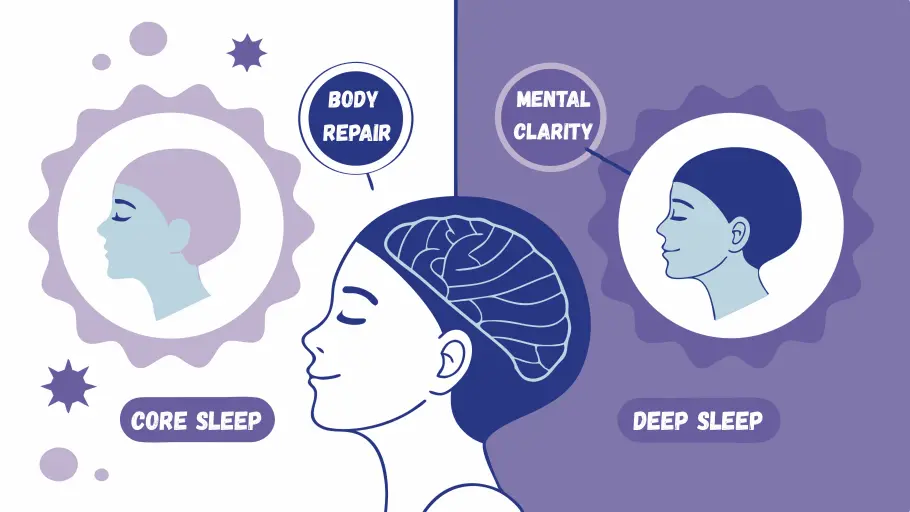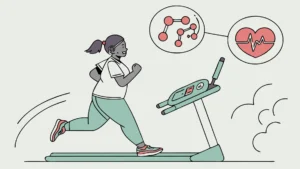Have you ever wondered why some nights you wake up feeling amazing after just six hours of sleep, while other nights you feel tired even after sleeping for eight hours? The secret lies in understanding what is core sleep and how it differs from deep sleep.
Many people think core sleep and deep sleep are the same thing, but they’re actually quite different. Learning about these two types of sleep can completely change how well you rest and how energetic you feel during the day.
How Sleep Works
Before we dive into what core sleep is, it’s helpful to understand how sleep works in general. Your sleep happens in cycles, with each cycle lasting about 90 to 100 minutes. Throughout the night, you’ll go through 4-6 of these cycles.
Each sleep cycle includes two main phases:
NREM (Non-Rapid Eye Movement Sleep): This has three distinct stages that get progressively deeper.
REM (Rapid Eye Movement Sleep): This is where most of your vivid dreaming happens.
The Three NREM Sleep Stages
Stage 1 – Light Sleep: This is the transition from being awake to falling asleep. It only makes up about 3-5% of your total sleep time. You can be easily awakened during this stage.
Stage 2 – Deeper Sleep: This accounts for about 45-50% of your total sleep. Your heart rate slows down, your body temperature drops, and your brain waves begin to slow. This stage helps prepare your body for the deepest sleep.
Stage 3 – Deep Sleep: Also called slow-wave sleep, this is where your body does most of its repair and strengthening work. This stage is crucial for physical recovery and memory consolidation.
Now that you understand how sleep cycles work, let’s explore what makes core sleep so special.

What is Core Sleep?
Core sleep is the most important part of your night’s rest – think of it as the VIP section of sleep. It happens during the first 3-5 hours after you fall asleep, when your body goes through its most important repair and recovery processes.
During core sleep, your body cycles through different sleep stages, including both deep sleep and REM (Rapid Eye Movement) sleep. This is when your body does the heavy lifting of restoration that keeps you feeling sharp and energetic the next day.
Why Core Sleep Matters Most
Your body is smart – if you don’t get enough sleep, it will prioritize core sleep first. This explains why sometimes a shorter night of good quality core sleep can leave you feeling better than a long night of poor, interrupted sleep.
Core sleep handles three main jobs:
Energy Recovery: Your body restores cellular energy and clears out waste products that build up during the day. Poor sleep quality can be one of the causes of low energy levels.
Physical Repair: Growth hormones are released to fix damaged tissues and boost your immune system.
Brain Maintenance: Your brain processes memories and gets neural pathways ready for optimal thinking the next day.
What is Deep Sleep?
Deep sleep is a specific stage within your sleep cycle – it’s also called slow-wave sleep or Stage 3 NREM sleep. During this time, your brain produces very slow delta waves, your breathing and heart rate slow down to their lowest levels, and your muscles become completely relaxed.
This is when you’re hardest to wake up – you’re truly “dead to the world.” Deep sleep is when your body does most of its serious repair work, making it absolutely crucial for both physical and mental health.
The Benefits of Deep Sleep
Deep sleep provides incredible benefits for your body and mind:
Hormone Release: Your body releases growth hormones essential for tissue repair and development.
Muscle Recovery: Damaged cells are rebuilt and muscles are strengthened – this is especially important if you’re active or play sports.
Immune System Boost: Your body produces infection-fighting proteins called cytokines to keep you healthy.
Memory Storage: Important information moves from short-term to long-term memory storage.
Brain Cleaning: Your brain’s waste removal system flushes out toxins, including proteins linked to Alzheimer’s disease.
Deep sleep typically happens more in the first half of the night and gets shorter as morning approaches. Most adults spend about 13-23% of their total sleep time in this restorative stage.
Core Sleep vs Deep Sleep: What’s the Difference?
| Aspect | Core Sleep | Deep Sleep |
|---|---|---|
| Scope | The first 3-5 hours of sleep (mix of all stages) | One specific stage (Stage 3 NREM) |
| Duration | ~3-5 hours of your night | ~1-2 hours total (varies by age) |
| Function | Overall energy and daily alertness | Intense physical repair and memory processing |
| Brain Activity | Mix of light sleep, deep sleep, and REM cycles | Slow delta waves only |
| When It Occurs | Early portion of the night, continuous block | Primarily first half of night, in cycles |
In short, core sleep includes deep sleep but also REM and other essential stages. Deep sleep is just one part of core sleep—but a powerful one.
Why Both Core and Deep Sleep Are Essential
Getting enough core sleep and deep sleep isn’t just about feeling rested – it’s about maintaining your physical health, mental clarity, and emotional well-being.
When you consistently get quality core sleep, you set yourself up for stable energy levels, better mood control, and sharper focus throughout the day. Deep sleep provides the intensive maintenance your body needs for long-term health.
Think of it this way: without enough core sleep, you’ll feel groggy and unfocused the next day. Without sufficient deep sleep, your muscles might feel sore, your immune system weakens, and your memory suffers.
The Combined Benefits
When you prioritize both types of sleep, you get:
- Sharper Focus: Core sleep maintains thinking ability while deep sleep helps with learning
- Better Mood: Proper sleep regulates stress hormones and emotional processing
- Stronger Body: Deep sleep boosts infection-fighting capabilities and physical recovery
- Better Performance: Core sleep maintains energy while deep sleep repairs muscles and tissues
cision-making. Tired after 8 hours of sleep? You might not be getting enough of the deep stuff.
How Much Core and Deep Sleep Do You Need?
Your sleep needs depend on your age, lifestyle, and individual factors. Here are the general guidelines:
Adults (18-64 years)
- Total sleep: 7-9 hours nightly
- Deep sleep: 1.5-2 hours (about 13-23% of total sleep)
- Core sleep: First 3-5 hours typically contain most deep sleep cycles
Older Adults (65+ years)
- Total sleep: 7-8 hours nightly
- Deep sleep: 1-1.5 hours (naturally decreases with age)
- Sleep quality becomes more important than quantity
Teenagers (13-17 years)
- Total sleep: 8-10 hours nightly
- Deep sleep: 1.5-2 hours (higher needs for growth and development)
Everyone is different. Some people naturally need more or less sleep, but consistently getting less than recommended amounts can hurt your health and daily performance. Missing deep sleep even during a long night can create “sleep debt.”
6 Practical Tips to Improve Core and Deep Sleep
The good news is you can take concrete steps to improve both your core sleep and deep sleep quality. Here are six practical strategies:
1. Keep a Consistent Sleep Schedule
Go to bed and wake up at the same time every day, even on weekends. This helps regulate your body’s internal clock and makes it easier to enter deep sleep naturally.
2. Create the Perfect Sleep Environment
Keep your bedroom cool (around 60-67°F), dark, and quiet. Use blackout curtains to block outside light and consider a white noise machine to mask disruptive sounds. Some people find that green noise for sleep or sleeping music for deep sleep can help create a more relaxing environment.

3. Limit Screens and Caffeine
Avoid caffeine after lunch and turn off phones, tablets, and computers at least one hour before bedtime. The blue light from screens can interfere with your body’s natural sleep hormone production.
4. Develop a Wind-Down Routine
Create a relaxing pre-bed ritual that signals to your body it’s time to sleep. This might include reading, gentle stretching, meditation, or taking a warm bath.
5. Stay Physically Active
Regular exercise, especially earlier in the day, promotes deeper sleep by helping regulate your body’s natural rhythm and reducing stress. Aim for at least 150 minutes of moderate activity per week.
6. Watch Your Evening Habits
Avoid large meals, alcohol, and too many fluids close to bedtime, as these can disrupt your sleep cycles. Instead, consider a light snack if you’re hungry or herbal tea to promote relaxation.
Even small changes to these areas can significantly boost your core and deep sleep quality. Start with one or two adjustments and gradually build your ideal sleep routine.

Invest in Better Sleep
Quality sleep isn’t a luxury – it’s a fundamental pillar of health that affects everything from your immune system to your ability to think clearly and maintain a positive mood.
By understanding what is core sleep and what is the difference between core and deep sleep, you’re taking the first step toward better rest. When you take steps to optimize both types of sleep, you’re investing in more energetic days and better long-term health.
Remember, your body will thank you for prioritizing good sleep habits. Start tonight by picking one tip from this guide and making it part of your routine. Better sleep – and better days – are just around the corner.
For more information about sleep stages and optimization, consider consulting with a sleep specialist or exploring resources from reputable sleep organizations.








